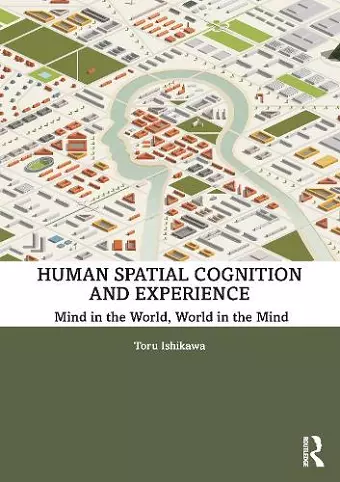Human Spatial Cognition and Experience
Mind in the World, World in the Mind
Format:Hardback
Publisher:Taylor & Francis Inc
Published:7th Jul '20
Currently unavailable, and unfortunately no date known when it will be back
This hardback is available in another edition too:
- Paperback£37.99was £37.99(9780815369868)

This book offers students an introduction to human spatial cognition and experience and is designed for graduate and advanced undergraduate students who are interested in the study of maps in the head and the psychology of space.
We live in space and space surrounds us. We interact with space all the time, consciously or unconsciously, and make decisions and actions based on our perceptions of that space. Have you ever wondered how some people navigate perfectly using maps in their heads while other people get lost even with a physical map? What do you mean when you say you have a poor "sense of direction"? How do we know where we are? How do we use and represent information about space?
This book clarifies that our knowledge and feelings emerge as a consequence of our interactions with the surrounding space, and show that the knowledge and feelings direct, guide, or limit our spatial behavior and experience. Space matters, or more specifically space we perceive matters. Research into spatial cognition and experience, asking fundamental questions about how and why space and spatiality matters to humans, has thus attracted attention. It is no coincidence that the 2014 Nobel Prize in Physiology or Medicine was awarded for research into a positioning system in the brain or "inner GPS" and that spatial information and technology are recognized as an important social infrastructure in recent years.
This is the first book aimed at graduate and advanced undergraduate students pursuing this fascinating area of research. The content introduces the reader to the field of spatial cognition and experience with a series of chapters covering theoretical, empirical, and practical issues, including cognitive maps, spatial orientation, spatial ability and thinking, geospatial information, navigation assistance, and environmental aesthetics.
"This book gives us a readable and comprehensive overview of a fast-developing interdisciplinary field. An excellent introduction for beginners, a welcome refresher for working scientists."—Nora S. Newcombe, Laura H. Carnell Professor of Psychology and James H. Glackin Distinguished Faculty Fellow, Temple University, USA
"This book is a timely addition to the literature on spatial and environmental cognition and experience. In this era of nearly unbridled enthusiasm for what neuroscience can reveal, Toru’s book reminds us that mind and behavior are not just in the brain, but in the brain and nervous system in the body in the physical and sociocultural world."—Daniel R. Montello, Professor of Geography, University of California, Santa Barbara, USA
"Toru Ishikawa presents an excellently written and concise account of research done on human spatial cognition. The book covers a full range of topics including motivation and history through methodological issues, empirical results to applications, and societal implications. A great introduction to the fascinating field of spatial cognition. The book should be read by everyone interested to understand how we know where we are."—Christian Freksa, Professor for informatics and director of the Bremen Spatial Cognition Center, University of Bremen, Germany
ISBN: 9780815369851
Dimensions: unknown
Weight: 700g
270 pages